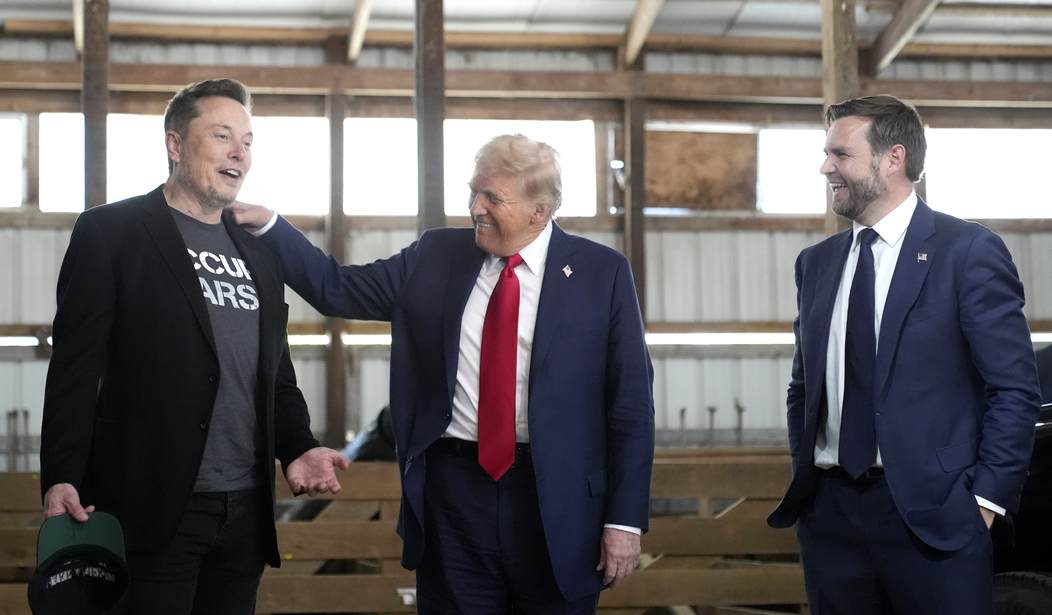The most consequential issue on the ballot this November is the fate of free speech: your ability to speak your mind.
At former President Donald Trump's campaign rally Saturday, Tesla CEO Elon Musk leaped on the stage and urged the nation to support Trump as the free speech candidate. It's "the bedrock of democracy," Musk said, warning that "the other side wants to take away your freedom of speech."
That's true. Vice President Kamala Harris and her running mate, Minnesota Gov. Tim Walz, want government and its proxies to muzzle us, limiting what we can post on social media, and censuring whatever government deems "misinformation" or hate.
The Constitution's framers understood the dangers of making government the arbiter of what the public should hear or read. The First Amendment bars government from "abridging the freedom of speech, or of the press."
Since the mid-20th century, the Supreme Court has consistently struck down government attempts to silence speech, even divisive, untrue or hateful speech.
In 1949, Father Arthur Terminiello, a communist, was arrested in Chicago for denouncing racial groups in a hate-filled speech. A city ordinance banned "speech that stirs the public to anger." But the Supreme Court overturned his conviction, ruling that "the vitality of civil and political institutions in our society depends on free discussion." The court added that speech "may indeed best serve its high purpose when it induces a condition of unrest ... or even stirs people to anger."
That includes hate speech. In 1969, in Brandenburg v. Ohio, the justices overturned the conviction of a Ku Klux Klan leader who uttered anti-Semitic and racist comments during an organizational meeting of Klan members. Ohio could not outlaw speech, said the court, unless it threatened imminent lawlessness.
Recommended
In 1989, the court ruled that Gregory Lee Johnson of Texas could not be punished for burning an American flag. "If there is a bedrock principle underlying the First Amendment, it is that government may not prohibit the expression of an idea simply because society finds the idea offensive or disagreeable."
In 2012, the justices made it clear that the First Amendment even protects misinformation and lies from criminal prosecution. The court invalidated a federal law making it a crime to falsely claim being the recipient of military honors. The court concluded that "falsity alone may not suffice to bring the speech outside the First Amendment." So don't worry, Walz. The Supreme Court has your back.
The court, referencing George Orwell's "1984," said it's not government's job to shield the public from falsehoods: "Our constitutional tradition stands against the idea that we need Oceania's Ministry of Truth."
The court has also ruled that political correctness must take a backseat to freedom of speech. In 2017, the court struck a U.S. Patent and Trademark Office regulation that blocked Simon Tam and his Asian American band members from calling their group "The Slants," which the USPTO had rejected as "disparaging."
Few reading these decisions will like all of them. Freedom of speech doesn't benefit one group. It's an even-handed principle that keeps democracy alive. The racist KKK member, the communist, and the anti-American flag burner are protected so that all of us can be confident we won't be jailed for expressing our views.
The First Amendment's purpose is to protect unpopular views. But according to a poll sponsored by the Foundation for Freedom of Individual Rights and Expression, half the country thinks First Amendment protections go too far, with Democrats especially opposed.
Walz and Harris, together with President Joe Biden, former Secretary of State Hillary Clinton and Rep. Adam Schiff, oppose free speech, particularly on social media platforms, the 21st-century public square. Walz insists there's no First Amendment protection for misinformation or hate speech. Staggering coming from a social studies teacher.
In 2019, Harris called for Twitter to deplatform Trump, arguing that online expression is a "privilege" and that censorship is necessary to protect democracy from those who spread misinformation.
In office, she and Biden erected a vast censorship operation in which White House and agency employees met with social media executives and told them what "misinformation" and individuals should be silenced. Even scientists questioning masking and vaccines were canceled, and their research was taken down, though some were later proved correct.
Facebook, YouTube and Google were pressured into doing the administration's dirty work. It continues now.
Two states and five individuals sued to stop what the federal district court called this "far-reaching and widespread censorship campaign." But the Supreme Court refused to rule on the censorship issue, citing a technicality -- the litigants lacked standing.
Alito, disgusted with the court's punt, warned that the Biden-Harris censorship scheme is "blatantly unconstitutional" and that the survival of democracy depends on protecting free speech.
Pay close attention to Alito's admonition. Those are the stakes in the upcoming election.

























Join the conversation as a VIP Member